Have you ever wondered about the powerful deities of ancient Greek mythology? These fascinating characters have captivated people for centuries with their incredible stories and complex relationships.
Read on to discover more about the 12 Olympian gods and goddesses, uncovering their unique attributes, intriguing tales, and powerful roles in Greek mythology.
Jump to:
The 12 Olympian Gods and Goddesses: Who Are They?
The Olympians are a group of 12 gods who ruled after the overthrow of the Titans. Each deity had unique powers and a distinct domain, from the seas to the skies, reflecting the diverse aspects of the world and human nature. Let’s find out more about each ruler.
1. Zeus: The Thunderous King
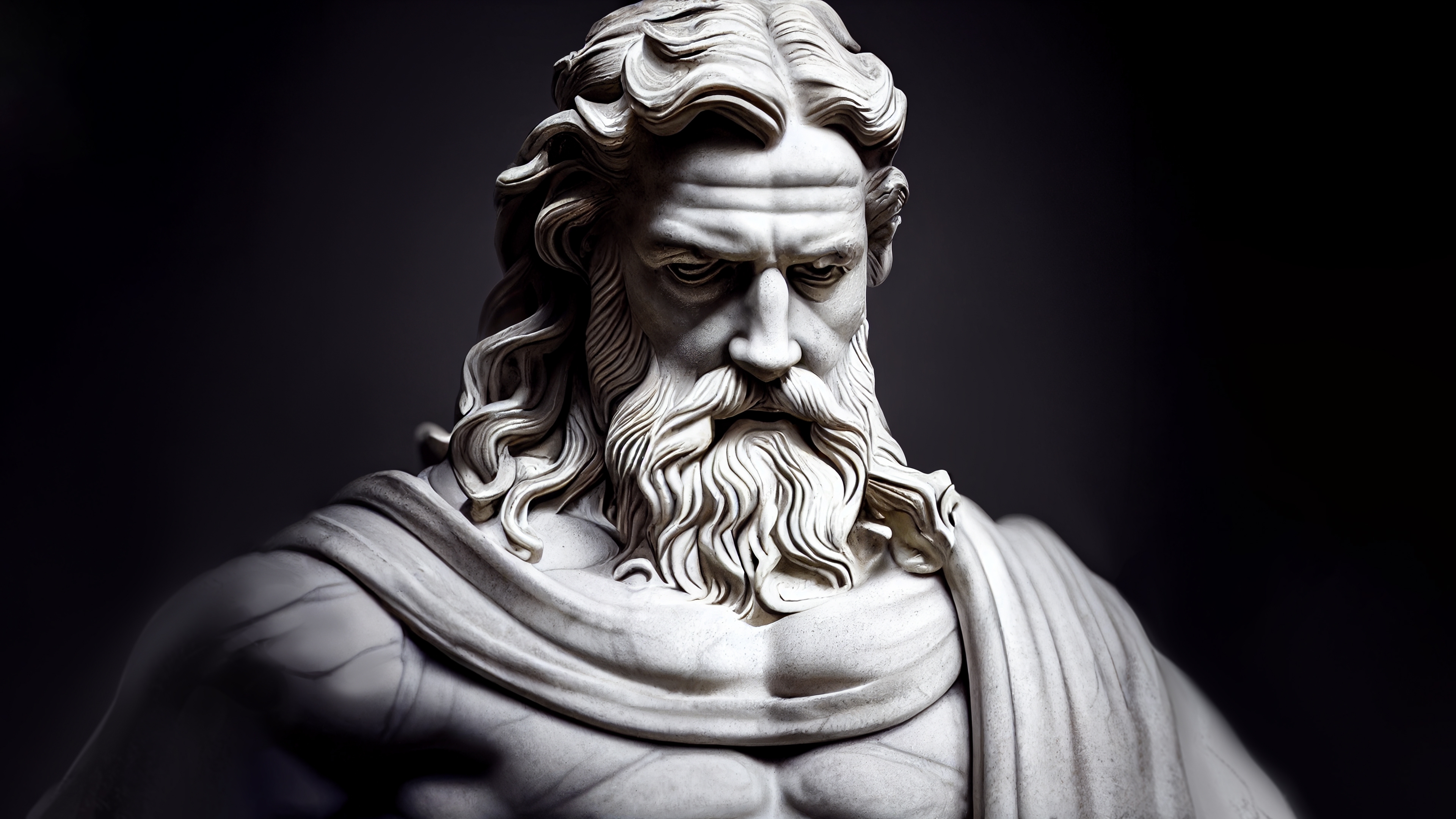
Zeus, often hailed as the most formidable in Greek mythology, stands as the king of the gods. His power and authority extend over the skies and the entire universe, making him a central figure in Greek mythology. Zeus symbolises justice, law, and order, often intervening in the affairs of gods and mortals to maintain balance and fairness.
Symbols of Power and Authority
Zeus's symbols reflect his immense power and the aspects of nature he controls:
- The Thunderbolt: Perhaps his most iconic symbol, the thunderbolt represents his control over the skies and his ability to wield power. It's a symbol of strength and authority, often used by Zeus to enforce his will and maintain order.
- The Eagle: This majestic bird, known for its keen sight and soaring heights, symbolises Zeus's role as a supreme overseer who watches over the world. The eagle is also a symbol of freedom and strength, mirroring Zeus's unconquerable nature.
- The Oak Tree: Known for its strength and longevity, the oak tree represents Zeus's enduring power and his role as a protector. The tree is often seen as a sacred place of refuge and a symbol of Zeus's generosity in providing shelter and sustenance.
Zeus in Mythology: A Complex Character
Zeus's character is often contradictory. While he is wise and just, he is also known for his numerous love affairs and unpredictable temperament. His relationships with other gods and mortals have shaped many of the myths and stories in Greek mythology, making him a central and dynamic character.
The Role of Zeus in Human Affairs
Zeus often involves himself in the lives of mortals, reflecting his interest and investment in the human world. He is known to give favours, deliver punishments, and offer guidance, shaping the destinies of heroes and the course of human history.
Zeus and the Governance of Olympus
As the ruler of Mount Olympus, Zeus takes charge of the council of gods, playing the role of a mediator and leader. His decisions often set the course for divine actions and reactions, highlighting his role in maintaining the balance of power among the gods.
2. Hera: The Queen of Olympus
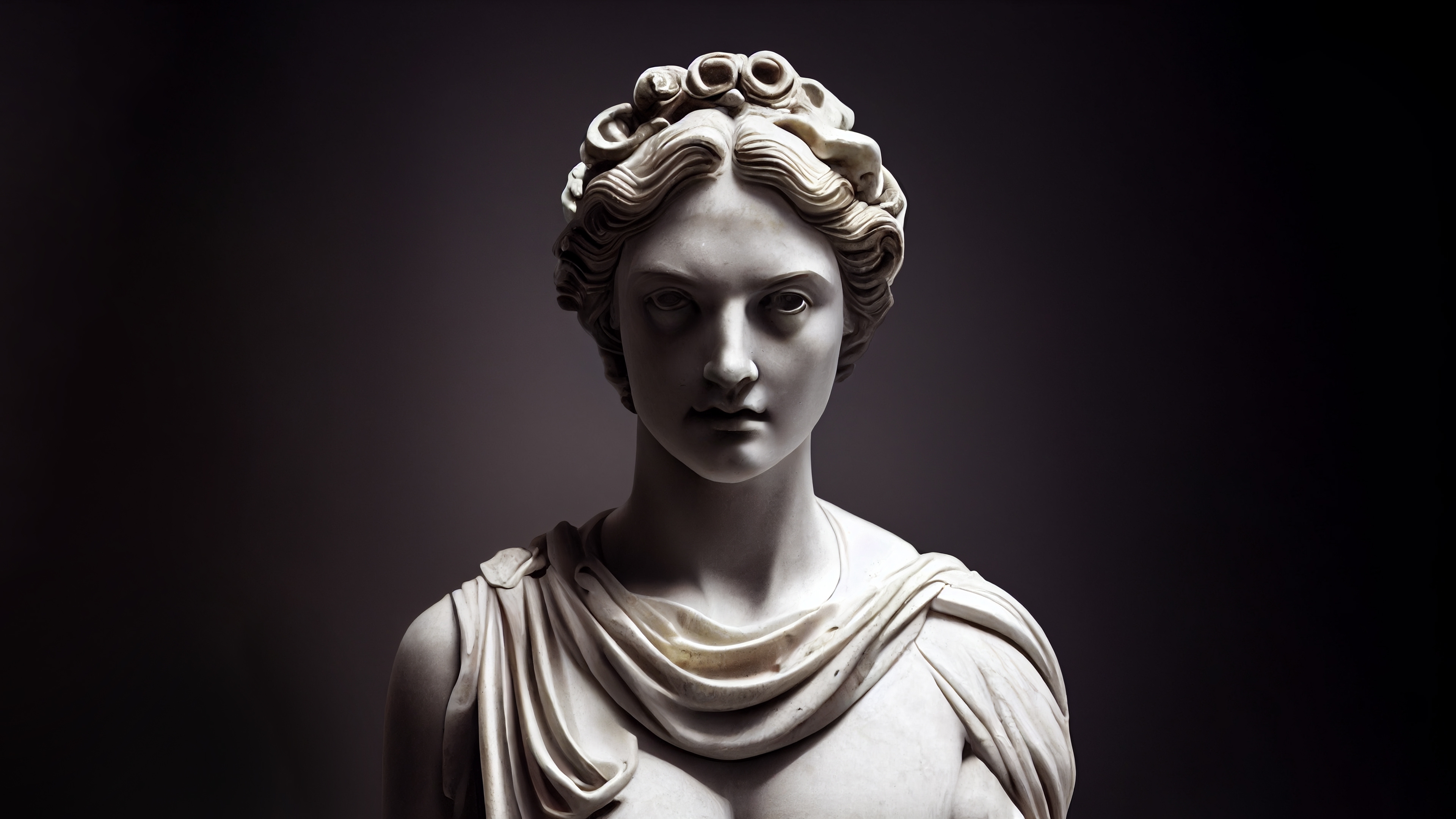
Hera, the wife of Zeus, holds a prestigious position in Greek mythology as the queen of the gods. Her power extends over marriage, women, childbirth, and family, making her a deity deeply intertwined with human life and relationships. Hera's influence and presence in Greek mythology are marked by her strong personality and the roles she plays, both in the divine realm and in the lives of mortals.
The Goddess of Marriage and Birth
Hera's association with marriage and childbirth speaks to her role as a protector and guardian of women, especially those in marital relationships and those who are expecting children. She is a symbol of marital fidelity, despite the ironic contrast of her husband's numerous affairs. Hera's concern for women's experiences in marriage and motherhood highlights her deep connection with the everyday lives of mortals.
Symbols of Hera's Majesty and Power
- The Peacock: Hera's most famous symbol, the peacock, with its splendid and colourful feathers, represents the goddess's majestic and regal nature. The eyes on the peacock's feathers symbolise the watchfulness and all-seeing nature of Hera.
- The Diadem: Often depicted wearing a diadem, Hera embodies royalty and authority. The diadem signifies her status as the queen of Olympus and a figure of high esteem and respect among the gods.
- The Pomegranate: Representing fertility, the pomegranate is another symbol of Hera, aligning with her role in childbirth and the nurturing aspects of her role.
Hera's Complex Personality
Hera is a deity of contrasts. While she is protective and caring towards women and families, she is also known for her jealousy and vengeful nature, particularly towards Zeus's lovers and their offspring. These traits make her a complex character in Greek mythology, often driving the narrative of various myths through her actions and reactions to Zeus's infidelities.
Hera's Role in Myths and Stories
Many myths involving Hera revolve around her reactions to Zeus's affairs and her interactions with other gods and mortals. These stories often highlight her intelligence, strategic thinking, and the lengths she will go to assert her position and maintain her dignity.
The Influence of Hera
Hera's influence extends beyond Mount Olympus. She is often involved in the affairs of heroes and features in many of the legendary Greek tales, including the Trojan War. Her blessings and curses have far-reaching consequences, sometimes affecting the fates of entire cities.
3. Poseidon: Ruler of the Seas
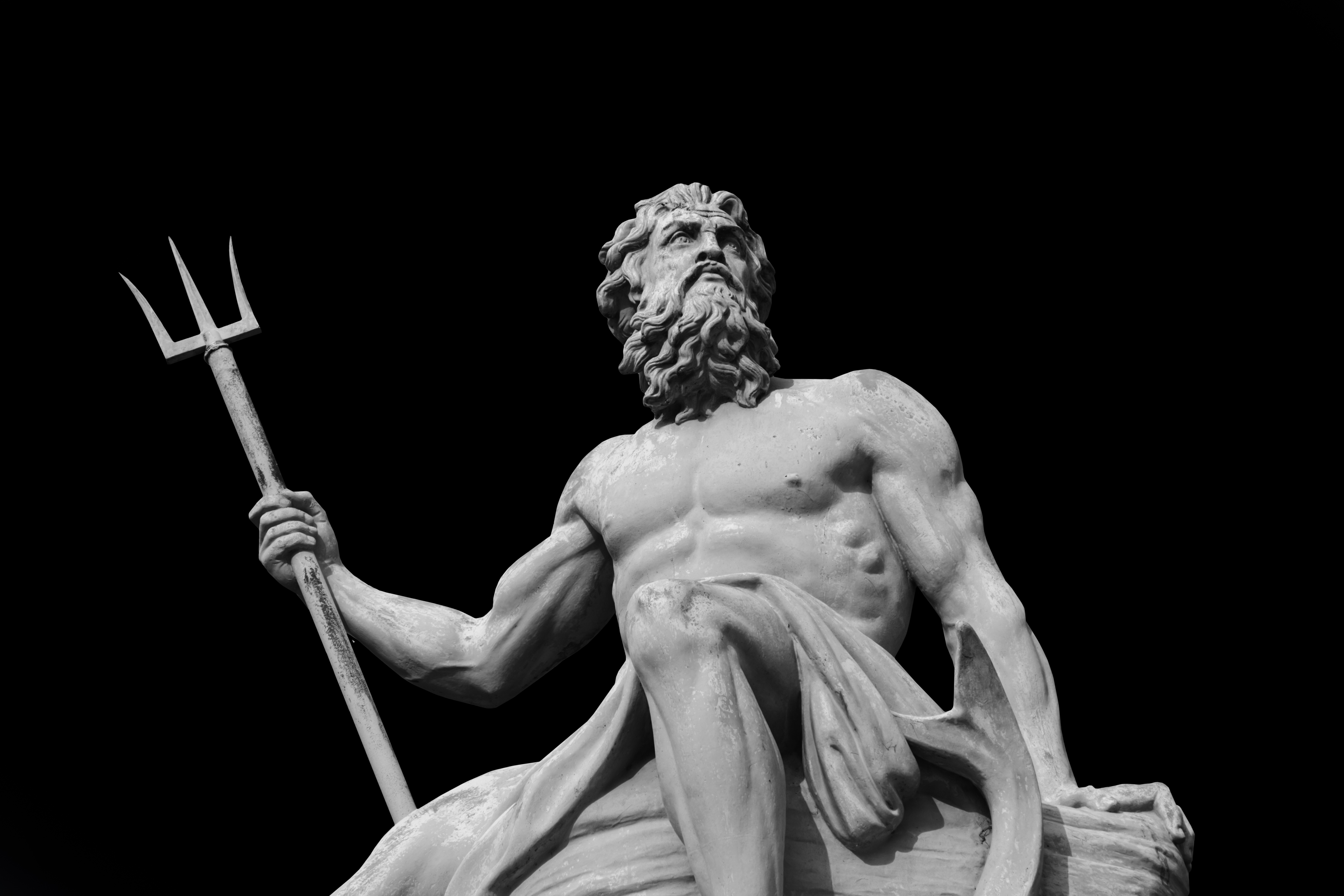
Poseidon, one of the most formidable gods in Greek mythology, reigns as the ruler of the seas and the god of earthquakes and horses. As the brother of Zeus, he holds a place of great power and authority. Poseidon's character in Greek mythology is multifaceted, embodying the unpredictable and often tumultuous nature of the sea.
Commanding the Oceans and Earthquakes
Poseidon's control over the seas made him a powerful deity for the ancient Greeks, who depended heavily on the ocean for travel and trade. He could both calm and stir the waters, using his powers to either help or hinder seafarers. Similarly, as the god of earthquakes, Poseidon's influence extends to the very foundations of the earth, capable of causing tremors and shaking the ground with his might.
The Trident: Symbol of Poseidon's Power
- The Trident: This three-pronged spear is a symbol of Poseidon's dominance over the seas. It represents his ability to stir up storms, cause springs to gush forth, and even shake the earth. The Trident symbolises Poseidon's strength and his role as a force of nature.
The Horses of Poseidon
Poseidon is also associated with horses, creating them in various myths. This connection highlights his role in life beyond the sea, extending his influence to land and the creatures that roam it. The horse, a symbol of strength, speed, and freedom, reflects the dynamic and powerful nature of Poseidon.
Poseidon in Greek Mythology
Poseidon plays a role in numerous Greek myths. His temperament, like the sea he governs, is often described as volatile and moody. He could be generous and helpful, but he could also be vengeful and destructive when angered or insulted. His interactions with other gods and mortals often revolve around issues of control, power, and respect.
Poseidon's Relationships and Descendants
Poseidon had many relationships and fathered several important figures in Greek mythology. Among his children were heroes like Theseus and mythical creatures like the winged horse Pegasus. These offspring often inherited some aspects of their father's formidable nature.
The Worship of Poseidon
In ancient Greece, Poseidon was worshipped as a major deity, particularly in coastal cities and towns. His temples and shrines were places of offering, where people sought his favour for safe sea voyages and protection from earthquakes.
4. Demeter: Goddess of Harvest
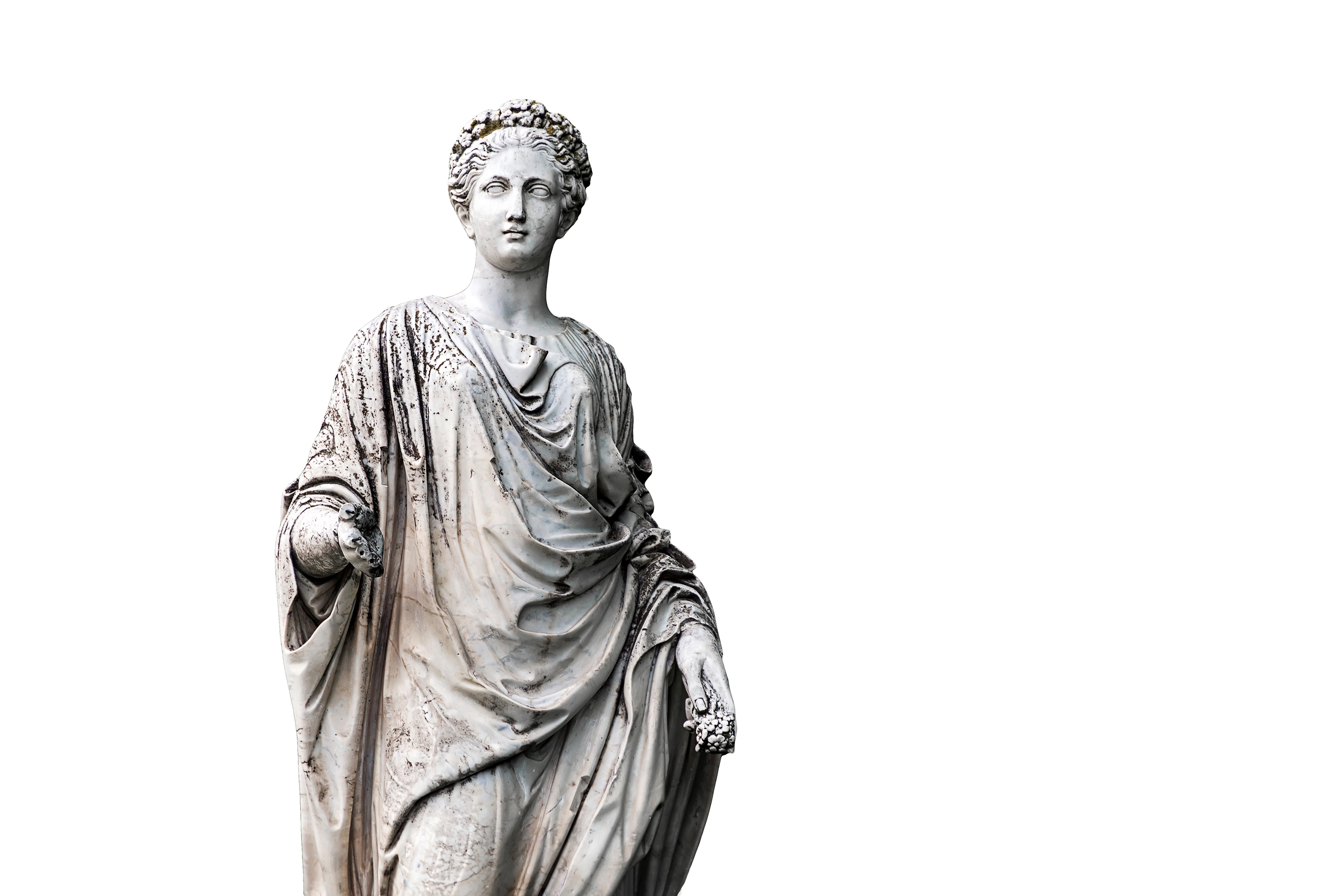
Demeter, known in the Greek pantheon as the goddess of agriculture, grain, and fertility, was known by ancient Greeks who relied heavily on the land for their livelihood. As the sister of Zeus, Demeter holds a significant place among the Olympians. She embodies the very essence of the life cycle in nature, from growth and nourishment to decay and renewal.
Nurturer of the Earth and Its Bounty
Demeter's primary role as the goddess of agriculture and fertility makes her a powerful deity for an agrarian society like ancient Greece. She is deeply connected to the earth, overseeing every aspect of farming - from the sowing of seeds to the harvesting of crops. Her powers also encompass sacred laws and the cycle of life and death, reflecting the natural rhythms of the earth.
Symbols of Demeter's Domain
- The Cornucopia: Often depicted with this symbol, the cornucopia or "horn of plenty" represents abundance and nourishment, directly linking Demeter to the bounty of the harvest.
- Sheaves of Wheat: As a symbol of agriculture, sheaves of wheat signify Demeter’s role in ensuring the fertility of the fields and the successful growth of crops.
- The Poppy: A flower often associated with Demeter, the poppy symbolises the cycle of life and death, a theme central to her mythos, especially in the story of her daughter Persephone.
The Tale of Demeter and Persephone
One of the most significant myths involving Demeter is her daughter Persephone's abduction by Hades, the god of the underworld. This story illustrates her role in the changing of the seasons and the cycle of life and death. Demeter’s grief at the loss of her daughter leads to the withering of crops and the onset of winter, while Persephone's return heralds the arrival of spring and the rebirth of the earth. This myth captures the essence of Demeter’s power and her deep connection to the natural world.
Demeter's Influence on Ancient Greek Culture
Demeter was a goddess of sacred law and the cycle of life. Her influence extended into religious practices, particularly in the Eleusinian Mysteries, ancient ceremonies that celebrated the cycles of life and were central to the religious life in ancient Greece. These rites were believed to offer insights into the mysteries of life and death and promised rewards in the afterlife.
The Worship and Festivals of Demeter
Demeter was widely worshipped across ancient Greece, with numerous festivals in her honour. The Thesmophoria, for example, was a festival celebrated by women, emphasising fertility and the agricultural cycle. Through these celebrations, the ancient Greeks acknowledged and honoured Demeter’s essential role in their daily lives and survival.
5. Athena: The Wise Warrior
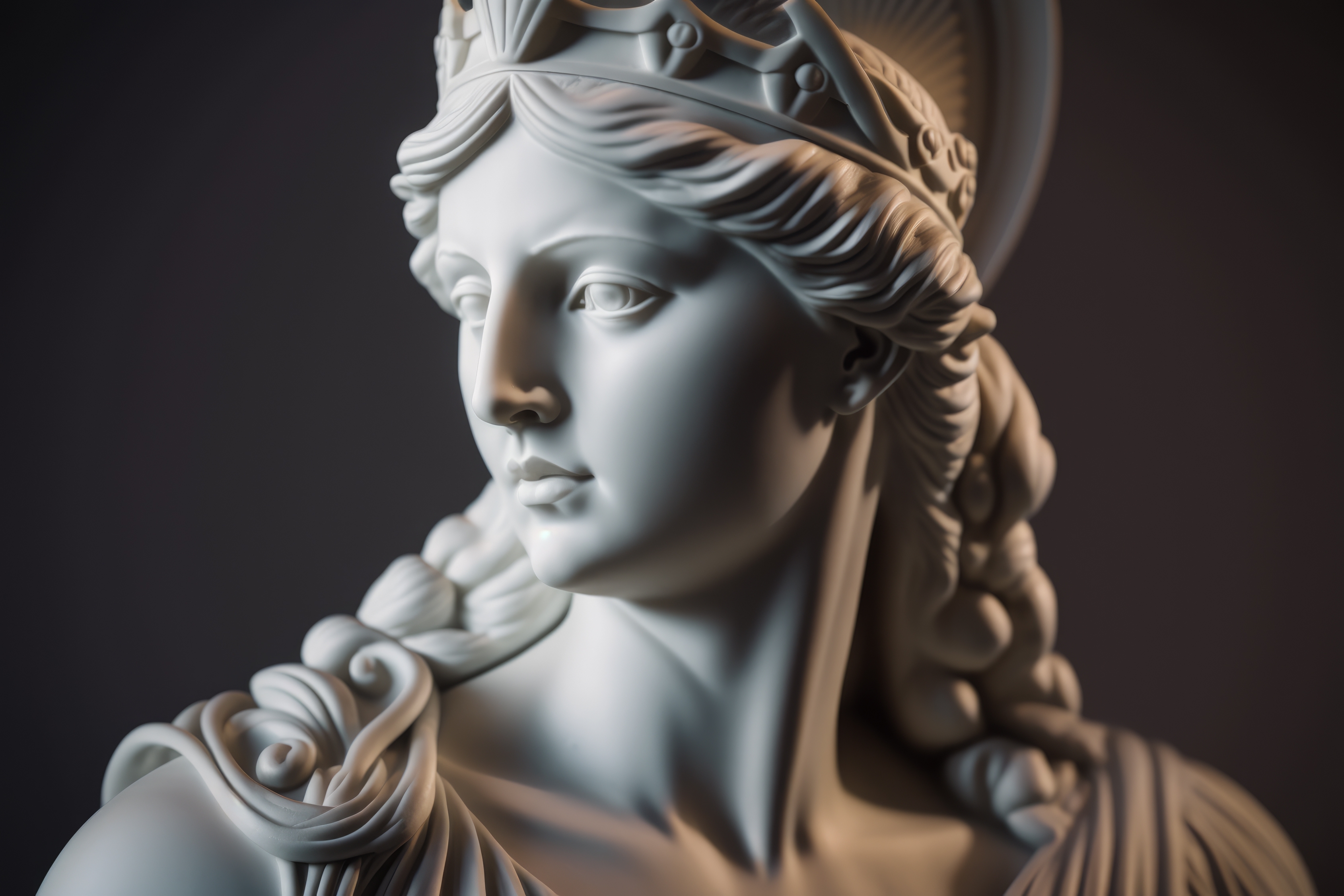
Athena is the goddess of wisdom, war, and various crafts, including weaving and pottery. Unique in her birth, she sprang fully grown and armoured from the head of Zeus, symbolising her connection to wisdom and strategic warfare. Athena stands out for her sharp intellect, strategic prowess, and her role as a protector of cities, most notably Athens.
Embodiment of Wisdom and Strategy
Athena's wisdom is often applied in strategy and warfare. Unlike Ares, the god of war known for his brute force, Athena's approach to conflict is characterised by cunning, strategy, and foresight. Her intelligence and wisdom extend to peaceful pursuits as well, guiding people in various skills and crafts.
Symbols Reflecting Athena's Nature
- The Owl: Often accompanied by an owl, Athena's association with this bird symbolises her connection to wisdom and knowledge. The owl, seen as a creature of keen sight in the dark, represents Athena's ability to see the truth and her insightfulness.
- The Olive Tree: Another symbol closely associated with Athena is the olive tree, representing peace and prosperity. According to myth, Athena gifted the olive tree to the city of Athens, securing her place as its patron deity and symbolising the nourishing, life-sustaining gifts she provides.
Athena in Greek Mythology
Athena's role in Greek mythology is varied. She is a warrior, a patron of heroes, and a guide to mortals. Her involvement in the tales of Perseus, Heracles, and Odysseus, among others, shows her as a supportive figure, assisting heroes with her wisdom and strategic insights. Furthermore, Athena is often portrayed as a mediator and a preserver of order, both among the gods and in the human realm.
Patroness of Cities and Crafts
Athena's patronage extends to cities, most notably Athens, which took its name from her. She is known as a protector of the polis, embodying the ideals of civilisation, wisdom, and strength. In addition, her love of crafts like weaving and pottery highlights her association with skilled labour and artistic talents, inspiring craftsmen and artists in their trades.
Athena's Influence on Ancient Greek Culture
Athena was seen as a role model for women in her role as a virgin goddess, representing independence and strength. Moreover, her qualities of wisdom and strategic warfare influenced the Greek concept of balanced power — strength paired with intelligence.
Festivals and Worship of Athena
Athena was worshipped through various festivals, the most famous being the Panathenaea in Athens. This festival included athletic and cultural competitions, celebrating Athena’s diverse roles and her importance in Athenian life.
6. Apollo: God of Many Arts
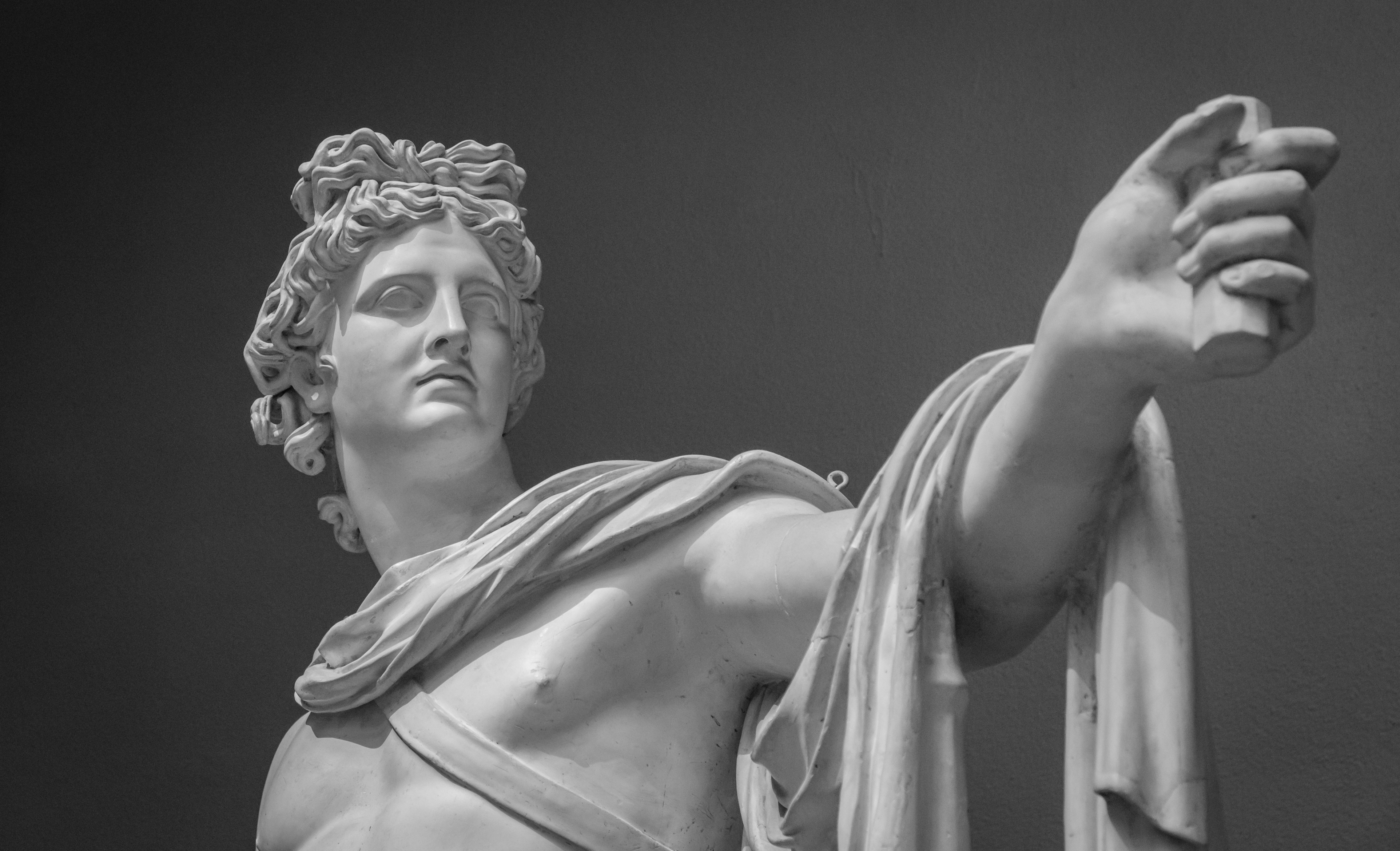
Apollo, one of the most conflicted figures in Greek mythology, is the son of Zeus and Leto and the twin brother of Artemis. He is celebrated as the god of music, poetry, art, prophecy, healing, and the sun, making him one of the most varied deities in the ancient Greek pantheon. His influence extends to life and culture, embodying the ideal of harmony and balance.
The Patron of Music and Arts
Apollo's association with music and the arts is central to his identity. He is often depicted with a lyre, an instrument he is said to have played with enchanting skill, bringing joy and harmony to gods and mortals. As a patron of poetry and the arts, Apollo represents the beauty and harmony of the creative process, inspiring artists, musicians, and poets throughout Greek mythology and culture.
Symbols of Apollo's Diverse Domains
- The Lyre: This stringed instrument is one of Apollo’s most iconic symbols, representing his patronage of music and the arts. The lyre’s sweet melodies are often associated with the harmony and order that Apollo brings to the mortal and divine worlds.
- The Sun: Apollo is also closely associated with the sun, symbolising light, clarity, and truth. As the god who drives the sun chariot across the sky, he brings light and life to the earth, governing the rhythms of days and seasons.
Apollo as the God of Prophecy and Healing
Apart from his artistic attributes, Apollo also rules over prophecy and healing. As the patron of the Oracle of Delphi, Apollo was believed to share divine knowledge and insight with entire cities. His association with healing includes protection against diseases and the promotion of health and well-being.
The Influence of Apollo in Mythology
Apollo's presence in Greek myths is significant. He is often portrayed as a figure of ideal youth and beauty, embodying the perfection of physical and intellectual pursuits. His adventures and interactions, whether in love or conflict, reveal aspects of his complex character — from his vengeful side, as seen in the punishment of Niobe, to his compassionate nature in the tales of his son Asclepius.
Apollo's Role in the Pantheon and Human Affairs
In the divine hierarchy, Apollo’s influence among the Olympians is clear, often serving as a mediator and a voice of reason. In the human world, he is known as a guide and protector, his temples serving as sanctuaries and places of worship where people sought guidance, healing, and artistic inspiration.
Celebrations and Worship of Apollo
Apollo was celebrated in numerous festivals, including the Pythian Games, which combined athletic and musical competitions. These celebrations honoured his diverse domains and brought communities together, reflecting his role in promoting social harmony and balance.
7. Artemis: The Huntress
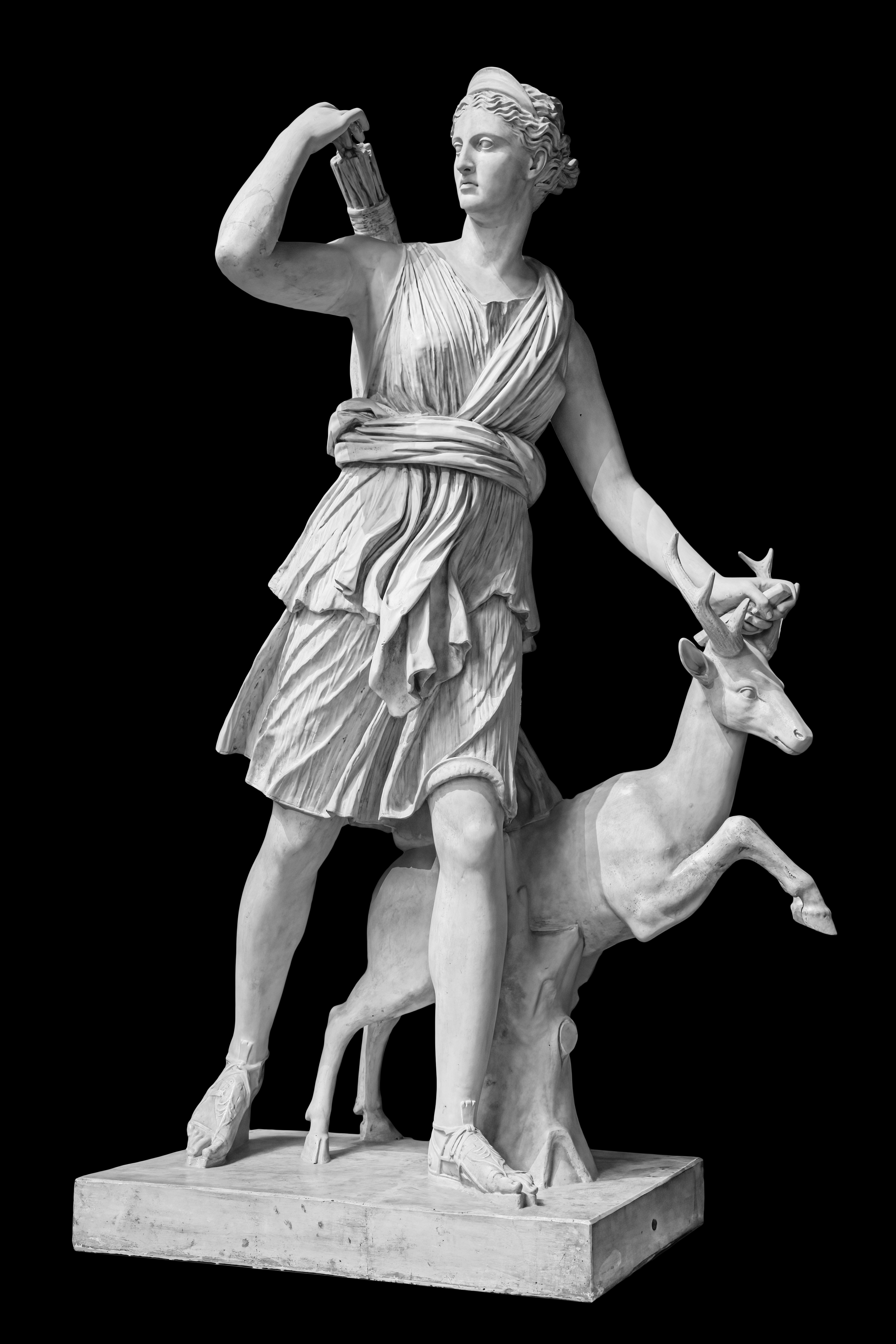
Artemis, the twin sister of Apollo and daughter of Zeus and Leto, is widely known as the goddess of the hunt, wilderness, childbirth, and the moon, embodying independence, strength, and a deep connection with nature. Artemis's role as a huntress and her association with the wild make her a unique and powerful deity in the Greek pantheon.
Guardian of the Wilderness and Wildlife
Artemis's primary domain is the wilderness, where she roams with her band of nymphs and is often depicted as the protector of wild animals. Her role as a huntress is not just about the pursuit of game but also about maintaining the balance of nature, ensuring that neither animals nor humans overstep the boundaries set by the natural world.
Symbols of Artemis's Dominion
- The Bow and Arrow: Artemis is frequently portrayed carrying a bow and arrows, symbolising her skill as a huntress and her ability to strike swiftly and decisively. These tools also represent her role as a protector of the wilderness and its creatures.
- The Moon: As a lunar deity, Artemis is often associated with the moon, highlighting her role in guiding the night and her connection with the mysterious and mystical aspects of nature. The moon also symbolises her femininity and her role as a guardian of women, particularly during childbirth.
The Virgin Goddess
Artemis is known as one of the virgin goddesses of Olympus, a status that symbolises her independence, self-sufficiency, and autonomy. This aspect of her character is important, as it represents her freedom from the traditional roles and expectations of women in ancient Greek society.
Artemis in Mythology
Artemis's myths often centre around themes of protection and chastity. Her fierce defence of her privacy and her companions is well-documented in tales where unwelcome suitors or disrespectful mortals are punished. These stories highlight her strong will, her assertiveness, and her unwavering commitment to her principles.
Protector of Women and Children
Beyond her role as a huntress, Artemis is also venerated as a protector of women, especially during childbirth, due to her connection with her own mother's painless birth. She is seen as a guardian who encourages the safe delivery of children, linking her to the cycle of life and the nurturing aspects of nature.
Worship and Festivals of Artemis
Artemis was worshipped across the Greek world, with numerous temples and sacred groves dedicated to her. Festivals in her honour often included athletic contests and rituals celebrating her dual nature as a nurturer and a fierce protector. The Brauronia, for example, was a festival where young girls participated in rites of passage, symbolising their transition under Artemis's watchful eye.
8. Ares: The God of War
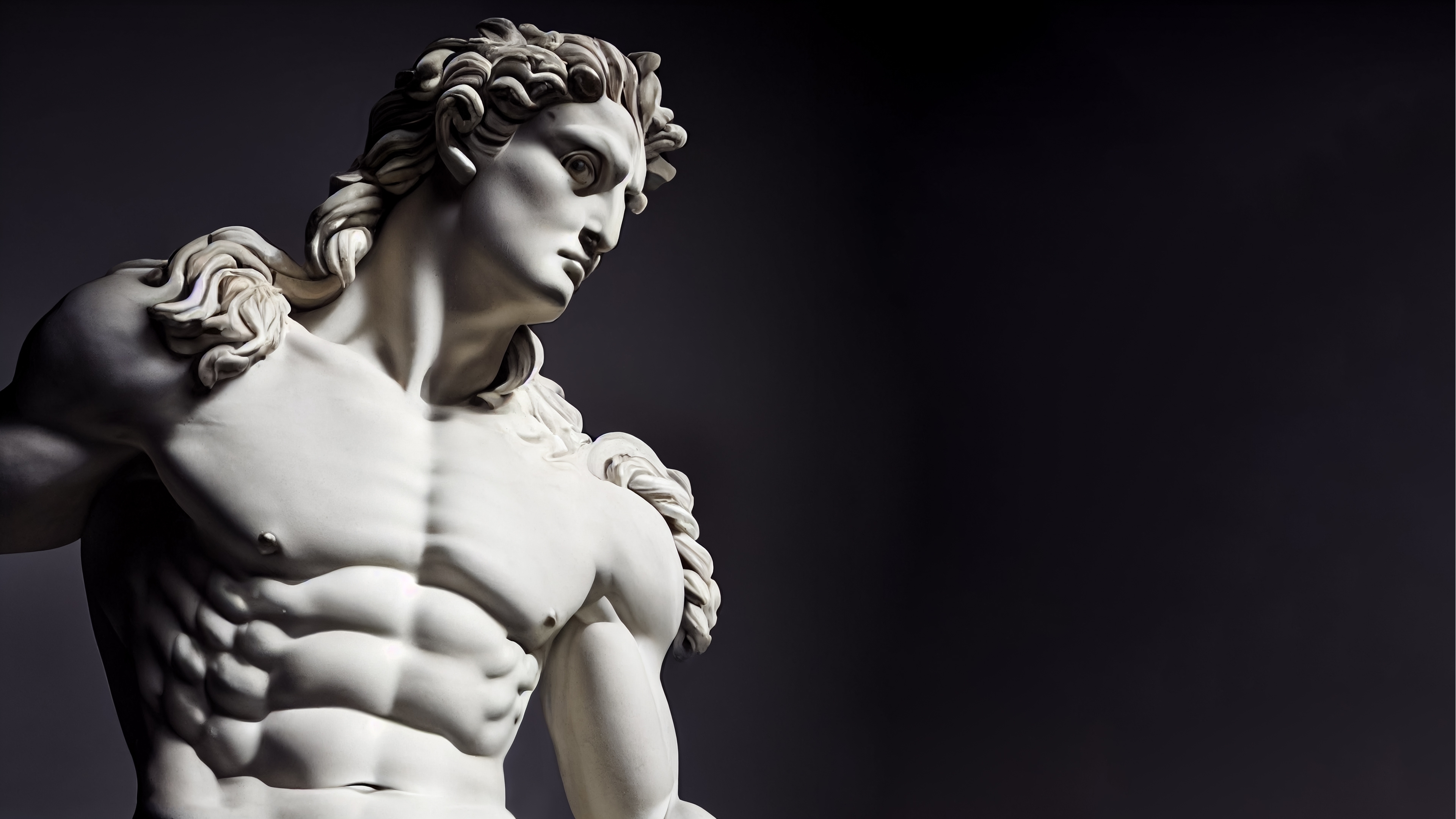
Ares, the son of Zeus and Hera, stands as a stark embodiment of the violence and chaos in war. In Greek mythology, he is the god of war, known for the raw, brutal, and tumultuous aspect of conflict. Ares's presence in the pantheon highlights the ancient Greeks' understanding of war's dual nature: both necessary and destructive, heroic and devastating.
The Personification of War's Ferocity
Ares represents the sheer force and frenzy of battle. He is often depicted as a fearsome warrior, revelling in the clamour and bloodshed of conflict. Unlike his sister Athena, who is associated with the strategic and just aspects of warfare, Ares embodies the chaotic and uncontrollable side of war, where rage and bloodlust reign.
Symbols of Ares’s Might
- The Spear and Helmet: These are the primary symbols of Ares, representing his martial prowess and readiness for battle. The spear signifies aggression and the relentless nature of warfare, while the helmet symbolises the protection of the warrior in the midst of combat.
- The Vulture: Often associated with Ares, the vulture represents the aftermath of battle – the death and decay that followed in the wake of war. It symbolises Ares's connection with the darker aspects of human conflict.
- The Dog: As a companion of Ares, the dog represents the unyielding and fierce nature of warfare. Dogs, often used in ancient battles, symbolise both loyalty to the warrior's cause and the savagery of war.
Ares in Greek Mythology
In mythology, Ares is often portrayed as unpredictable, driven by his passions rather than reason or justice. His love affairs, notably with Aphrodite, the goddess of love, and his conflicts with other gods, especially Athena, underscore his volatile nature and the complex relationships he maintains within the pantheon.
The Worship of Ares
While Ares was not as widely known as other Olympian gods, he had his temples and places of worship, particularly in regions where war was a significant part of life. In Sparta, a city known for its martial culture, Ares was held in high regard, embodying the ideals of strength, courage, and resilience in the face of conflict.
Ares’s Role in the Human Realm
Ares's influence extends to the human realm, primarily in the context of war and conflict. Warriors would invoke his name for strength and victory in battle, seeing him as a divine embodiment of the warrior spirit. However, his impulsive and destructive nature also served as a cautionary tale about the consequences of unchecked aggression and the importance of balance in warfare.
9. Aphrodite: Goddess of Love and Beauty
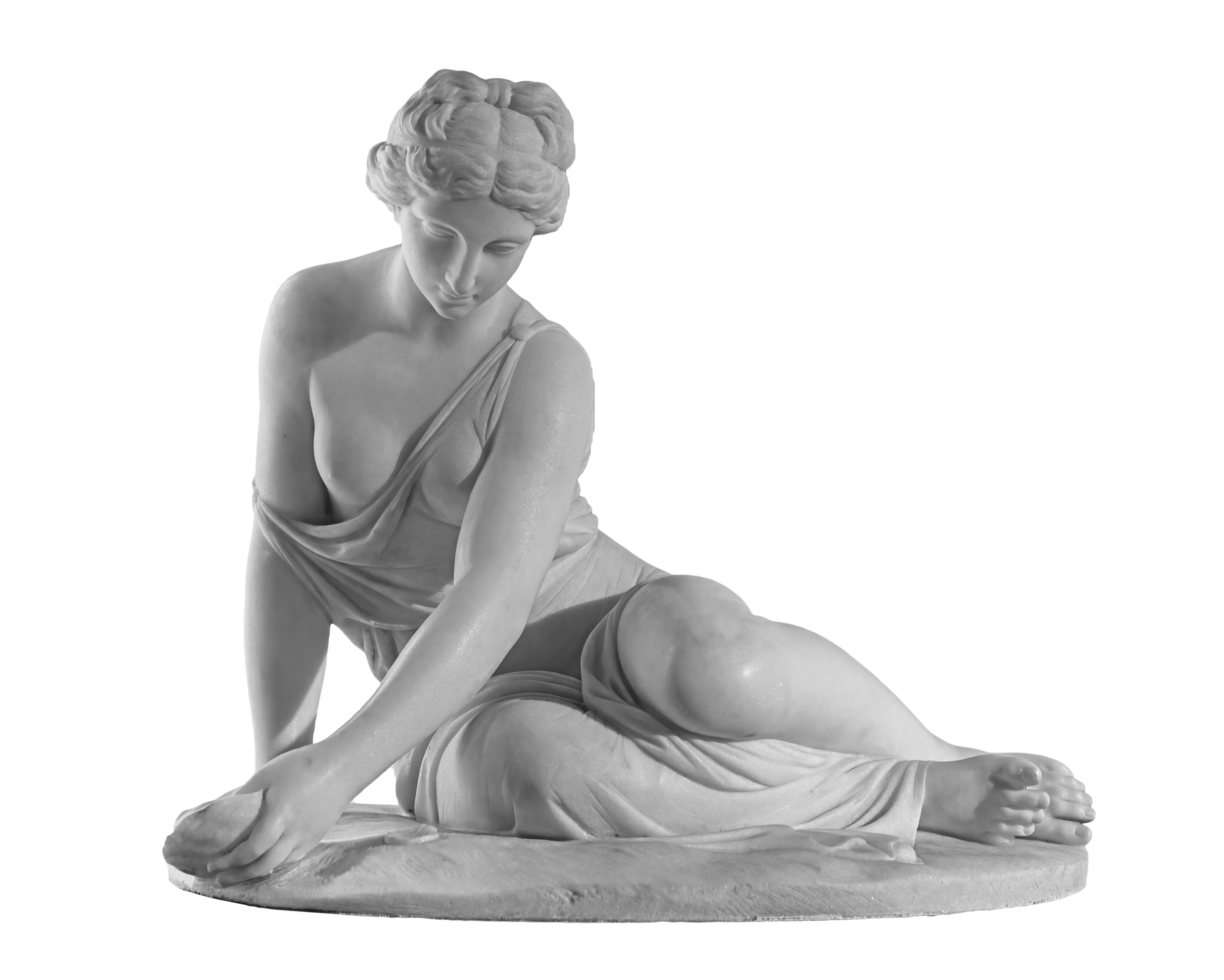
Aphrodite, known in Greek mythology as the goddess of love, beauty, and desire, is one of the most enchanting and influential figures in the ancient Greek pantheon. According to myth, she was born from the foam of the sea, a beginning connecting her to beauty and the primal powers of nature. Aside from physical attractiveness, Aphrodite symbolises the complex nature of love and desire and their profound effects on gods and mortals alike.
The Embodiment of Love and Attraction
Aphrodite encompasses all forms of love and beauty, from romantic and erotic attraction to the aesthetic beauty found in nature and art. She has the power to ignite passion and desire among humans and within the gods, often leading to intricate and dramatic affairs in the mythical narratives.
Symbols of Aphrodite's Essence
- The Dove: Often accompanied by doves, Aphrodite’s association with this bird symbolises love, gentleness, and affection. The dove represents the softer, nurturing aspects of love and the peacefulness it can bring.
- The Rose: Another symbol strongly linked to Aphrodite is the rose, an emblem of beauty and passion. The rose, with its delicate petals and thorns, reveals the dual nature of love – its ability to bring both joy and pain.
Aphrodite in Greek Mythology
Aphrodite plays a central role in numerous Greek myths, where her influence over love and desire often shapes various events and stories. Her relationships, particularly with Ares and the mortal Adonis, and her involvement in the judgment of Paris, which ultimately led to the Trojan War, highlight her role in shaping mythical narratives.
The Power of Beauty and Desire
Aphrodite's power extends beyond the mere concept of physical beauty. She represents the allure and persuasive power of attraction, influencing humans and the natural world.. Her ability to sway the hearts of gods and mortals speaks to the ancient Greek understanding of love and desire as powerful and sometimes uncontrollable forces.
Worship and Festivals of Aphrodite
Aphrodite was celebrated in various parts of the Greek world, with numerous temples and festivals in her honour. Celebrations dedicated to her, like the Aphrodisia, were occasions of joy and reverence, often involving rituals and ceremonies that celebrated love, beauty, and the fertility of nature.
10. Hephaestus: Master of the Forge
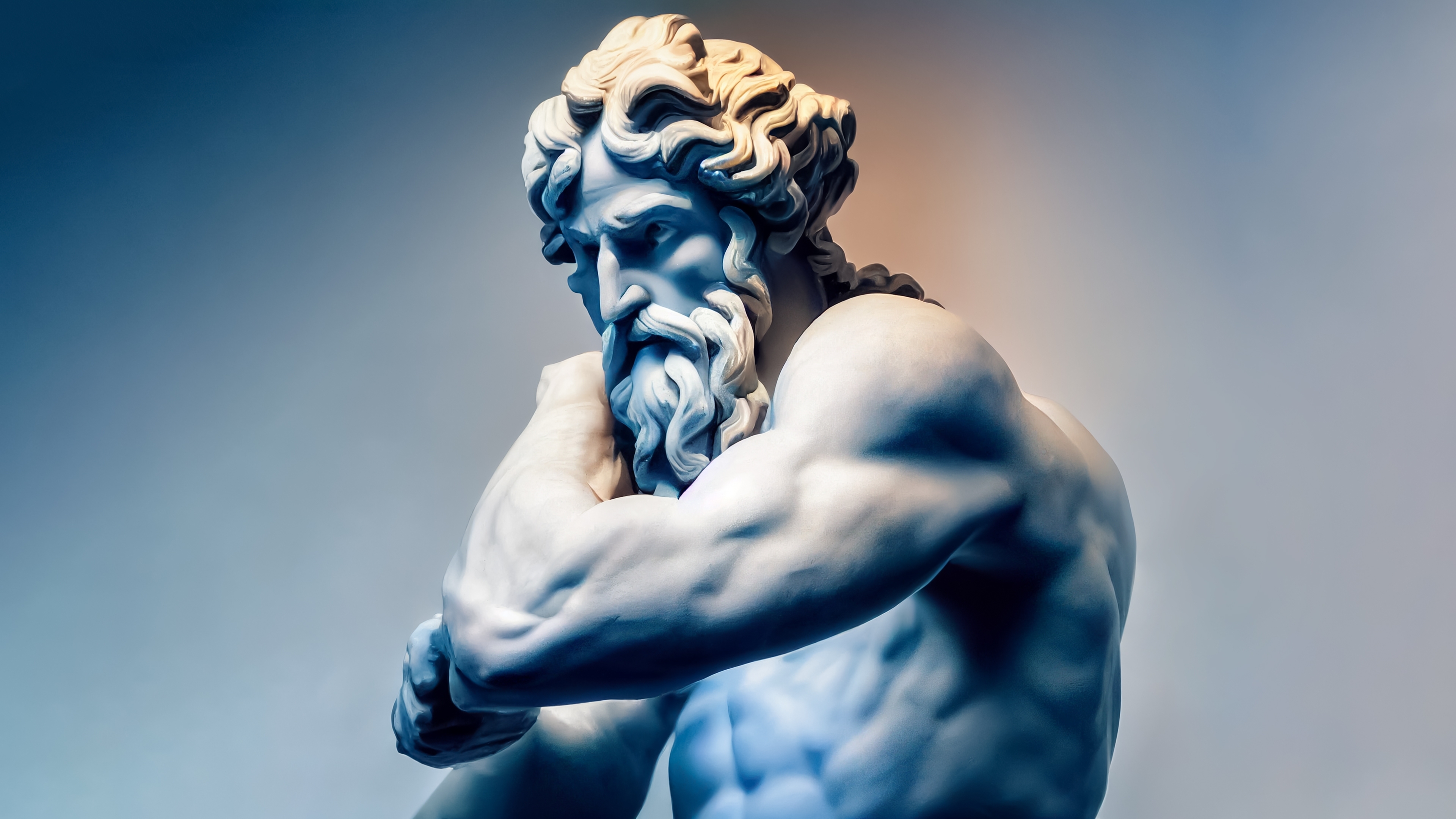
Hephaestus, the son of Hera and often acknowledged as the god of fire, metalworking, and craftsmanship in Greek mythology, is a unique figure among the Olympian deities. His story is one of resilience and skill. Despite facing rejection and ridicule due to his physical imperfections, Hephaestus became known for his incredible talent in crafting and forging weapons and armour for gods and heroes.
The Embodiment of Craftsmanship and Creativity
Hephaestus is the divine embodiment of all forms of craftsmanship and creativity. His forge, located under a volcano, is where he meticulously crafts items with immense skill and ingenuity. Hephaestus's creations are often imbued with magical properties and exquisite beauty, reflecting his status as a master craftsman.
Symbols of Hephaestus's Artistry
- The Anvil and Hammer: These are the primary symbols associated with Hephaestus, representing his skill and labour in the forge. The anvil and hammer signify the hard work and dedication required to master the art of metalworking and craftsmanship.
- The Volcano: Often connected with volcanoes, Hephaestus symbolises the transformative power of fire. Volcanoes, with their fiery and unpredictable nature, serve as a metaphor for Hephaestus's forge where raw materials are transformed into beautiful and powerful objects.
Hephaestus in Greek Mythology
In mythology, Hephaestus's story is often marked by themes of rejection, perseverance, and eventual triumph. Cast out of Olympus by his mother Hera due to his deformity, Hephaestus's journey is one of overcoming adversity. Despite these challenges, he earns his place among the gods through his unmatched skill and craftsmanship.
The Role of Hephaestus in the Pantheon
Hephaestus plays an important role among the Olympians, providing them with their iconic weapons and tools. From Zeus's thunderbolts to Achilles' armour, Hephaestus's creations are integral to many myths and legends. His ability to create objects of immense power and beauty reflects the ancient Greeks' respect for the art of craftsmanship and the transformative power of fire.
The Human Aspect of Hephaestus
Despite his divine status, Hephaestus is often seen as the most human of the gods. His physical imperfections, struggles, and hard work resonate with the human experience, making him a relatable and sympathetic figure. Hephaestus embodies the ideals of resilience, creativity, and the value of skill over physical appearance.
Worship and Festivals of Hephaestus
In ancient Greece, Hephaestus was worshipped as the patron of craftsmen, particularly those working in metal. Festivals in his honour, such as the Chalkeia, celebrated craftsmanship and the skills of artisans. Temples and shrines dedicated to Hephaestus were often sites of craftsmanship and innovation.
11. Hermes: The Swift Messenger
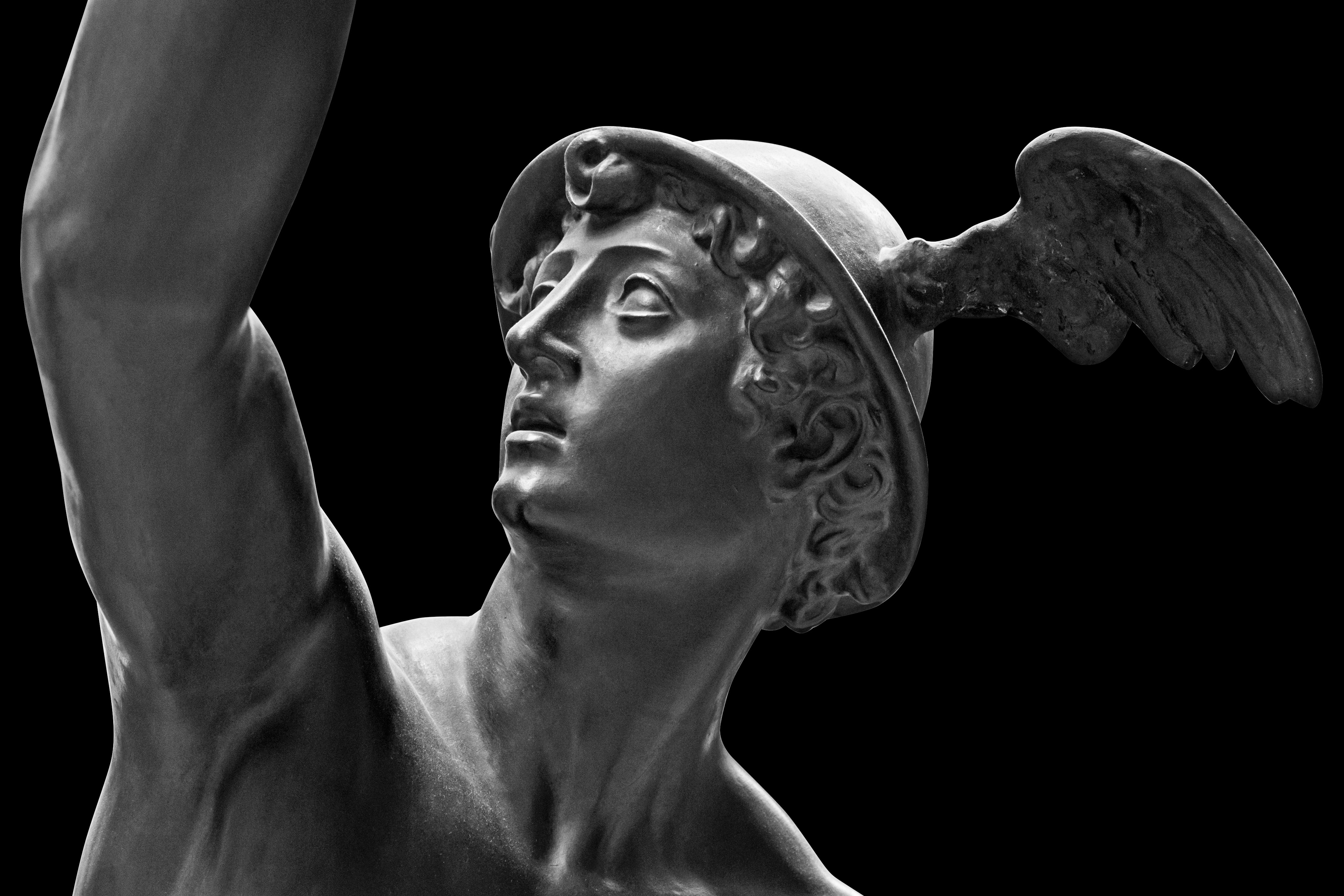
Hermes, recognised in Greek mythology as the son of Zeus and the nymph Maia, is the messenger of the gods. Known for his speed, cunning, and versatility, Hermes serves as a bridge between the divine and mortal worlds. He is also the god of commerce, thieves, travellers, and the guide of souls to the underworld, making him a deity of many talents and domains.
The Embodiment of Speed and Eloquence
Hermes's primary role as the messenger of the gods requires incredible speed and agility, traits for which he is well-known. His ability to move swiftly between gods and mortals symbolises the flow of communication and the exchange of information, both divine and earthly.
Symbols of Hermes's Versatility
- Winged Sandals (Talaria): Perhaps the most iconic attribute of Hermes is his winged sandals, which grant him the ability to fly and travel quickly across great distances. These sandals symbolise his role as a messenger and his freedom to move across the skies and the earth.
- Winged Helmet: Hermes's winged helmet also signifies his swiftness and agility. It represents his intellect and cunning, essential attributes for a god who deals with messages, trade, and negotiation.
- The Caduceus: Hermes's staff, entwined with two serpents and often topped with wings, is a symbol of his role as a guide and mediator. It represents negotiation, commerce, and balance, reflecting Hermes's varied nature.
Hermes in Greek Mythology
Hermes's presence in Greek myths is marked by his cleverness, resourcefulness, and playful nature. He is often depicted outwitting other gods or mortals, using his cunning and cleverness to achieve his goals. From his infancy, where he steals Apollo's cattle, to his role in guiding and protecting heroes like Odysseus, Hermes's actions are often driven by his wit and ingenuity.
The Protector of Travelers and Guide to the Underworld
Beyond his role as a messenger, Hermes is also known as the protector of travellers, ensuring their safety on journeys. He is known to offer help and guidance to those on the move, whether they are merchants, adventurers, or ordinary travellers. Additionally, Hermes serves as the psychopomp, the guide of souls to the underworld, a role that highlights his connection with the transition between life and death.
Worship and Cult of Hermes
In ancient Greece, Hermes was worshipped as a god of various aspects of daily life, including commerce, roads, and borders. His statues, often placed at crossroads, served as markers and protectors for travellers. Festivals in his honour, like the Hermaea, were celebrated, particularly by athletes and merchants.
12. Dionysus: The God of Wine
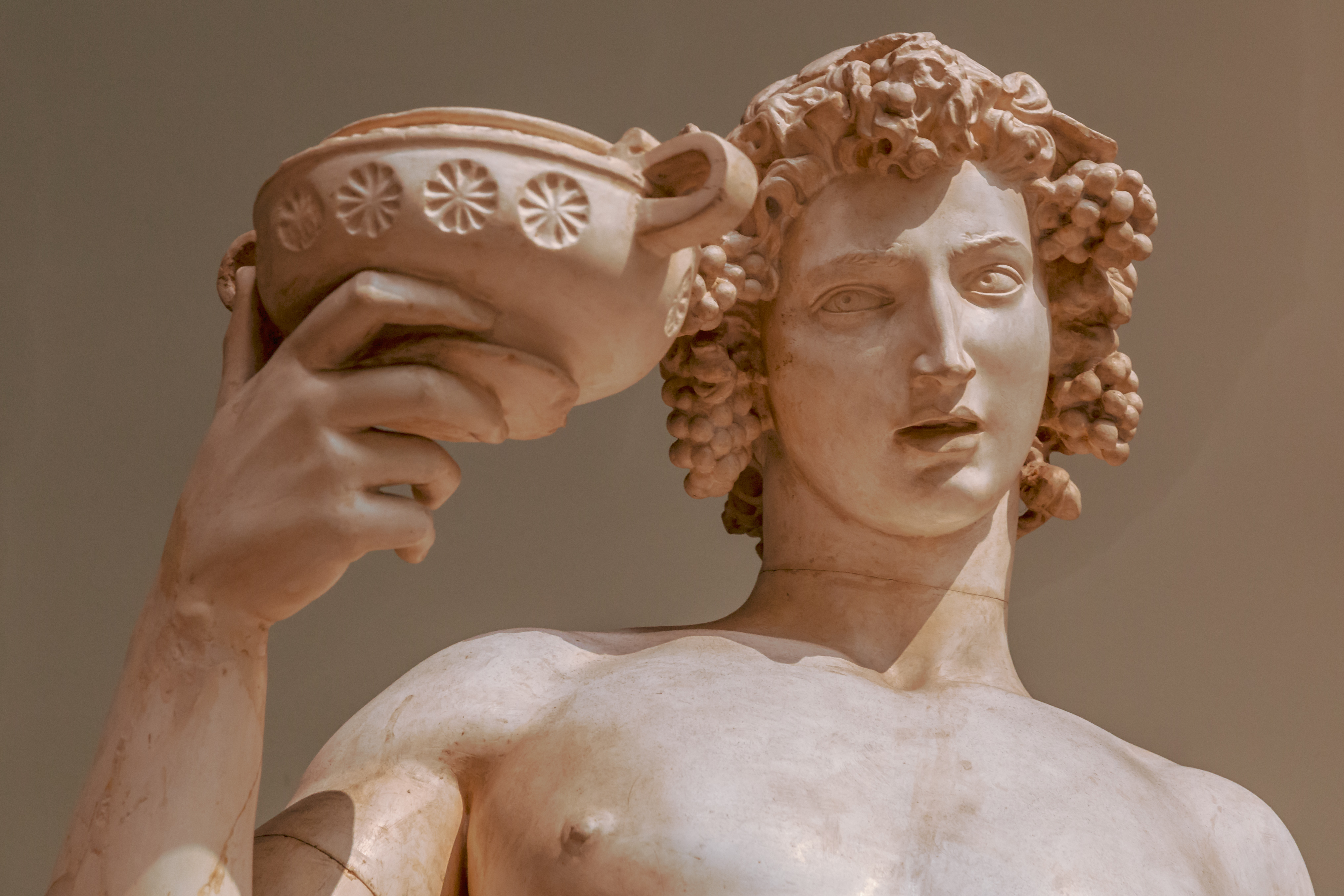
Dionysus, a unique and complex figure in Greek mythology, is the son of Zeus and the mortal Semele. He stands among the Olympian gods as the god of wine, festivity, ecstasy, and theatre. Dionysus embodies the concept of contradiction and change: he brings joy and divine ecstasy yet also unleashes chaos and madness. His worship and mythology highlight the ancient Greeks' recognition of the dual nature of life's pleasures and the transformative power of the arts.
The Patron of Wine and Celebration
Dionysus's association with wine and festivity positions him as a deity who transcends the ordinary aspects of human life, offering a gateway to joy, uninhibited celebration, and the breaking of social norms. His role in promoting viticulture and the enjoyment of wine symbolises the physical pleasures of the drink and its capacity to liberate the spirit and emotions.
Symbols of Dionysus's Power
- The Grapevine: Dionysus is often depicted with grapevines, representing the cultivation of grapes for winemaking. The grapevine symbolises abundance, pleasure, and the transformative nature of fermentation, turning grapes into an intoxicating beverage.
- The Thyrsus: A staff entwined with ivy and topped with a pinecone, the thyrsus represents prosperity, fertility, and the god's ability to bring joy and ecstasy, as well as his connection to nature and the wild.
Dionysus in Greek Mythology
Dionysus's myths are filled with themes of transformation, liberation, and the blurring of boundaries. His birth and life story, marked by tragedy, rebirth, and journeying across the world, reflect the transformative experiences he offers to his followers. He is often seen challenging the status quo, breaking down social and personal barriers, and encouraging his devotees to embrace their primal selves.
The God of Theatre and Ritual Madness
Dionysus's connection to theatre and ritual is significant. He is credited with the development of Greek drama, particularly tragedy and comedy, which were integral parts of Dionysian festivals. These theatrical forms were deeply connected to the spiritual and the emotional.
The Worship and Festivals of Dionysus
Dionysian worship involved ecstatic rituals, including processions, music, dancing, and the consumption of wine. Festivals in honour of Dionysus, like the Dionysia, were key cultural events, blending religious worship with performances and revelries. These celebrations allowed people to express and release emotions and desires often suppressed in everyday life.
Dionysus's Role in Human Experience
Dionysus represents an essential aspect of the human experience: the need for emotional release, the enjoyment of life's pleasures, and the recognition of the beauty and tragedy of existence. His worship encouraged a deeper understanding of the self and the embracing of life's dualities.
Frequently Asked Questions About Greek Gods and Goddesses
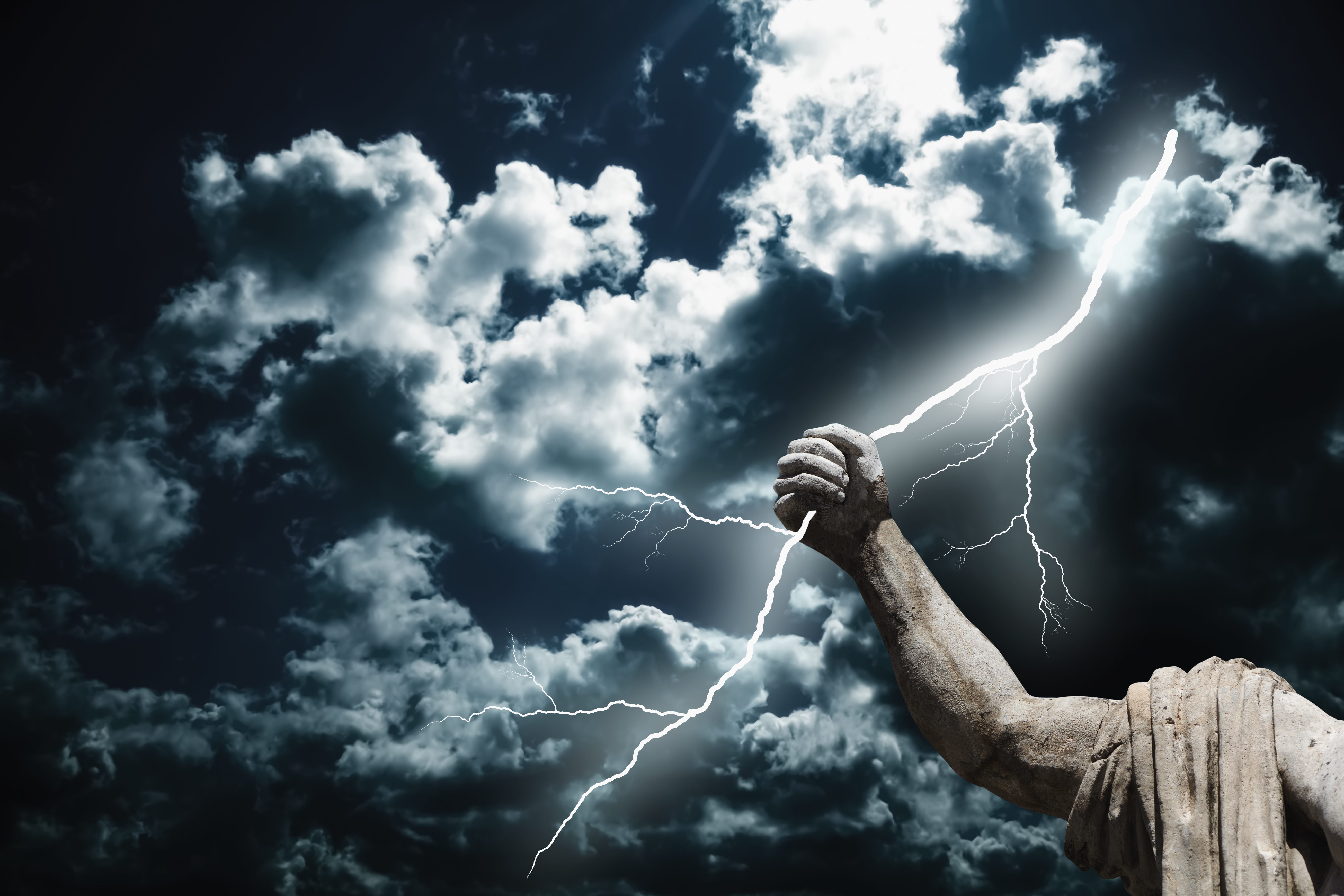
Who is the Deadliest Greek God?
Ares, the god of war, often takes the title of the deadliest Greek god. His fierce and aggressive nature in battle, along with his passion for conflict, makes him a formidable and deadly figure in Greek mythology.
Who is the Most Handsome Greek God?
Apollo is celebrated for his artistic and physical beauty. Known as the god of music, light, and poetry, his charming appearance and talent make him the epitome of handsomeness in Greek mythology.
Who is the Kindest Greek Male God?
Hephaestus is often viewed as the kindest among the male gods. Despite his physical struggles and challenges, his gentle nature, particularly in his craftsmanship and dealings with mortals, sets him apart.
Who is the Original Greek God?
Chaos is often considered the original entity from which all the gods emerged in Greek mythology. It represents the void state preceding the creation of the universe.
Which Greek God is Obsessed with Their Looks?
Narcissus, though more a mythical figure than a god, is famous for his obsession with his own beauty. His story is a cautionary tale about the dangers of excessive vanity.
Who is the Male God of Love?
Eros, often depicted as a youthful figure, is the Greek god of love and desire. He is known for wielding a bow and arrows, with which he would strike people, causing them to fall in love.
Which Greek God Was Fat?
Dionysus, the god of wine, festivity, and ecstasy, is sometimes portrayed as plump or heavy, symbolising indulgence and the excesses of feasting and celebration.
What Greek God is Beautiful?
Besides Apollo, Aphrodite, the goddess of love and beauty, is known for her stunning appearance. Her beauty is so intense that it often causes trouble among the gods.
Which Greek God Blinded Himself?
According to some legends, Oedipus, a tragic hero rather than a god, blinded himself. His story is a poignant tale of fate and self-inflicted tragedy.
Is Nike a Greek God?
Nike is the Greek goddess of victory. She is often depicted with wings and is known for her speed and strength, symbolising triumph in various endeavours.
Who Was the Most Just Greek God?
Themis, often associated with divine law and order, is considered one of the most just deities. She played a key role in maintaining balance and order in the universe.
What God Was the Protector of Travellers and Thieves?
Hermes, known for his swiftness and cunning, was the protector of travellers, merchants, and also thieves. He was a messenger and a guide, adept at moving between different worlds.
Recommended for you!
Best SellersExplore Ancient Myths with Centre of Excellence
Dive into the captivating era of Greek mythology with our comprehensive Greek Mythology Diploma Course. This journey through ancient tales is perfect for anyone eager to unravel the mysteries of Olympus and beyond.
What You'll Discover in the Course:
- Intricate Mythology Tales: Delve into the rich stories and legends that form the backbone of Greek mythology. Learn about the powerful Olympian gods, their intriguing relationships, and their impact on human history.
- Deeper Understanding of Divine Dynamics: Gain insights into the complex dynamics of the Greek god family tree. Understand how these relationships shaped myths and explore the themes of power, loyalty, and conflict among the deities.
- Symbols and Significance: Uncover the symbols and significance of each deity. From Zeus's thunderbolt to Athena's owl, learn how these symbols contribute to our understanding of these ancient figures.
- Cultural Impact and Legacy: Explore how Greek mythology has influenced modern culture, art, literature, and psychology. Understand the enduring legacy of these myths in today's world.
Special Offer for Mythology Enthusiasts:
For a limited time, we are thrilled to offer the Greek Mythology Diploma Course for just £29, saving you over £10!













